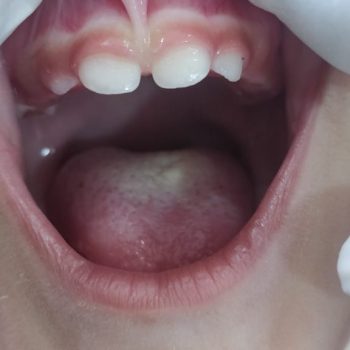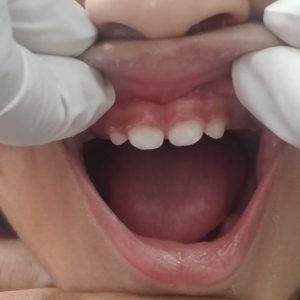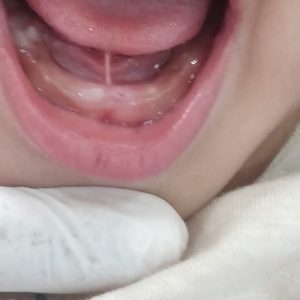Lip and Tongue Ties
Lip and Tongue Tie
The different parts of your baby’s mouth may have funny names, but they serve important purposes. That piece of tissue between their lips and gums? That’s called the frenulum. The mucus membrane below the center of their tongue is called the lingual frenulum.
A lip tie occurs when your baby’s frenulum is too thick or too stiff. This prevents the upper lip from moving freely. A tongue tie occurs when your baby’s lingual frenulum is too short, too tight, or positioned too close to the tip of their tongue. This negatively affects their tongue maneuverability.
If left untreated, either of these conditions can lead to difficulties with breastfeeding, bottle feeding, and even speech development. It can also cause issues with your child’s gums or impede permanent tooth eruption down the road.
Lip Tie
Lip Tied

Lip Tie After Release

Tongue Tie

5 Signs of a Lip and Tongue Tie
Both lip ties and tongue ties can make it difficult to feed your new-born effectively. Here are a few signs that this condition could be at the root of your challenges.
- Difficulty Latching During Breastfeeding
In breastfeeding, latching refers to the way your baby attaches to your breast. A proper latch is comfortable and pain-free, with your baby’s chest and stomach resting against your body. Their mouth should be fully over the entire breast, rather than just the nipple. If your baby has a tongue or lip tie, you might find that the initial process of latching isn’t as seamless as it should be. Your baby might struggle to get a comfortable latch or have difficulty remaining latched.
- Painful Breastfeeding
If you’ve never breastfed before, the sensation can be a little unusual. However, it shouldn’t be painful.
If you find the process uncomfortable, it might be because your baby hasn’t successfully latched in the right position. For instance, a tongue-tied baby might concentrate too much force on your nipple, which can cause pain.
- Infant Fatigue While Breastfeeding
There’s no denying that nursing can put a tired baby right to sleep! For that reason, you might find that your little one reaches for you when they’re fussy, sleepy, or in distress. The act relaxes, comforts, and soothes them.
Yet, the intent isn’t for them to become fatigued while struggling to latch and feed properly. If you notice that the act of trying to nurse is frustrating and exhausting your baby, this could also be a sign of a lip or tongue tie. You may also notice they’re getting tired because it’s difficult for them to breathe while feeding. This is especially common in babies with a tongue tie, as they can’t perform the wave-like motion required to move food from the front of their mouth to the back before swallowing. This can result in a poor breath pattern, which can cause your baby to become overwhelmed and exhausted.
- Poor Weight Gain
Every baby is different, but most will lose between 7% and 10% of their birth weight as soon as they’re born. However, most will regain that weight within two weeks of their birth. Does it seem as though your baby hasn’t reached that mark?
A visit to the pediatrician’s office can reveal if their weight gain isn’t where it needs to be. This could be a sign of inadequate feeding or incomplete nutrition, both of which could be attributed to lip or tongue ties.
- Limited Tongue Mobility
Little ones have some pretty hilarious facial expressions, and a tongue-out giggle is one of them! Can your baby stick their tongue out all the way? If they have a tongue tie, this mobility might be fully or partially limited.
Again, this can make breastfeeding uncomfortable and unproductive. Your baby’s tongue needs a full range of motion to latch onto your breast successfully.
Next Steps to Take for Baby’s Lip or Tongue Tie
If you suspect that your baby might have a lip tie or tongue tie, then the first step is to schedule a consultation with your pediatric dentist or pediatrician. These experts are well-versed in these conditions and can evaluate whether the symptoms your baby is exhibiting confirm a diagnosis.
If they confirm that this is the issue, don’t panic. In most cases, simple laser surgery is all that’s needed to correct the problem. This procedure is called a frenectomy, and we can perform it right in our office. Our pediatric dentist will address the inflexible tissue that’s causing the tongue or lip tie during this treatment. Before we begin, we’ll use gentle anesthesia to make sure your child is comfortable throughout the process.
At your request, we can also consult your baby’s pediatrician or your lactation consultant about the issue before we begin treatment. This way, everyone understands the treatment required and can work together to monitor your baby’s post-op development.
Will These Problems Go Away on Their Own? What happens if we do not treat these issues?
For most babies as they get older, the problems just change, they don’t go away.
Mothers and babies with less obvious ties have struggled through the infant period with terrible nursing trouble including pain while breastfeeding, dealing with excessive spit-up , reflux medication, painful gas, colic, and sleepless nights. Then they get older and start solid feeding, and the baby gags, chokes, spits out food, and can’t seem to get the hang of solids. And then they have speech delay or trouble with articulation, or it seems like their speech is “thick.” All the while, they have “just been a terrible sleeper” and move around in their sleep, are light sleepers, wake often, and mouth breathe or snore at night. This is the typical patient that we see at least a few times each day as an older child that struggled mightily in the first few years of life.
We also see kids with a to-the-tip tie who can sometimes compensate and learn to speak perfectly, but they have other issues with sleep, eating, neck tension, headaches, and other more adult symptoms that again don’t go away, just change as the child matures.
In short,tongue and lip ties can affect the development of your infant, and the only way to correct it is with a quick, painless and bloodless surgery.
Get Help For Your Baby’s Lip or Tongue Tie
If your baby isn’t feeding properly or the process is causing either of you discomfort, then it’s worth taking the time to have them evaluated for a tongue or lip tie. Though it can feel overwhelming, this condition is more common than you’d think. It’s easy to diagnose and the treatment is refreshingly simple.
At Toothbuddies, we can use laser surgery to eliminate this medical issue and encourage more comfortable, effective feedings. The surgery is precise, convenient, and can be done with minimal discomfort ,even in newborns.
Contact us today to schedule an appointment, and we’ll look forward to seeing your family soon!
